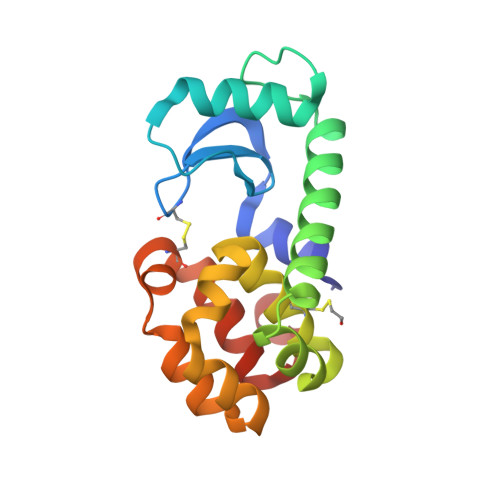Use of stabilizing mutations to engineer a charged group within a ligand-binding hydrophobic cavity in T4 lysozyme.
Liu, L., Baase, W.A., Michael, M.M., Matthews, B.W.(2009) Biochemistry 48: 8842-8851
- PubMed: 19663503
- DOI: https://doi.org/10.1021/bi900685j
- Primary Citation of Related Structures:
3GUI, 3GUJ, 3GUK, 3GUL, 3GUM, 3GUN, 3GUO, 3GUP - PubMed Abstract:
Both large-to-small and nonpolar-to-polar mutations in the hydrophobic core of T4 lysozyme cause significant loss in stability. By including supplementary stabilizing mutations we constructed a variant that combines the cavity-creating substitution Leu99 --> Ala with the buried charge mutant Met102 --> Glu. Crystal structure determination confirmed that this variant has a large cavity with the side chain of Glu102 located within the cavity wall. The cavity includes a large disk-shaped region plus a bulge. The disk-like region is essentially nonpolar, similar to L99A, while the Glu102 substituent is located in the vicinity of the bulge. Three ordered water molecules bind within this part of the cavity and appear to stabilize the conformation of Glu102. Glu102 has an estimated pKa of about 5.5-6.5, suggesting that it is at least partially charged in the crystal structure. The polar ligands pyridine, phenol and aniline bind within the cavity, and crystal structures of the complexes show one or two water molecules to be retained. Nonpolar ligands of appropriate shape can also bind in the cavity and in some cases exclude all three water molecules. This disrupts the hydrogen-bond network and causes the Glu102 side chain to move away from the ligand by up to 0.8 A where it remains buried in a completely nonpolar environment. Isothermal titration calorimetry revealed that the binding of these compounds stabilizes the protein by 4-6 kcal/mol. For both polar and nonpolar ligands the binding is enthalpically driven. Large negative changes in entropy adversely balance the binding of the polar ligands, whereas entropy has little effect on the nonpolar ligand binding.
- Institute of Molecular Biology and Department of Physics, 1229 University of Oregon, Eugene, Oregon 97403-1229, USA.
Organizational Affiliation:




















